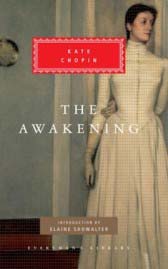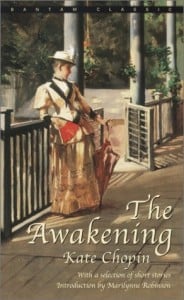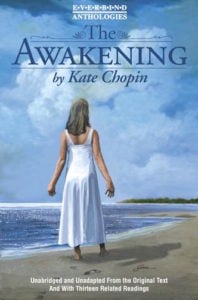The Awakening by Kate Chopin — an original 1899 review
By Taylor Jasmine | On February 23, 2015 | Updated September 24, 2024 | Comments (2)

The Awakening by Kate Chopin is a short novel, published in 1899. Now considered a feminist classic, it was widely criticized, even reviled when first published.
The heroine, a young Creole named Edna Pontellier, searches for meaning outside her accepted roles of wife and mother. She also seeks sexual fulfillment and independence.
It’s more accurate to say that The Awakening was silenced rather than was banned after initial publication, as is commonly believed. Critics were brutal; one called the story “poison,” which captured the prevailing sentiment of others.
After quietly disappearing for many decades, the book re-emerged in the late 1960s to take its place as a protofeminist classic. Rather absurdly, decades later, it appeared on the American Library Association’s list of most frequently banned books of the years 2010–2019. The Awakening‘s initial reception certainly discouraged Chopin in her writing career.
In Diving Deep and Surfacing: Women Writers on Spiritual Quest (1980), Carol P. Christ delves into the novella’s significance on many levels, including the spiritual:
“Chopin stresses that to awaken is risky. She alludes to the sea as seducing the soul … and when Edna swims out too far, she glimpses a ‘quick vision of death’ that ‘smote her soul.’ The element of danger in Edna’s experience … is a common feature of mystic experience …
For a woman the risk is that when the patriarchal definitions of her being are stripped away, she will be faced with radical freedom; she will have no guidelines to tell her how to act. She must have courage, clear-sightedness, and awareness of the consequences of her choices or she may lose herself.
Edna’s mystical experience reflects wholeness. She is not transported out of the body into a transcendent world. Instead the experience is extremely physical, even sensual, and in it she finds revealed the power of her body as well as her soul. For her physical, sexual, social, and spiritual awakenings occur together.”
Certainly, initial reviewers of The Awakening failed to see the multi-layered meanings of the slim book, nor could they have foreseen the impact it would have on future generations.
Following is a fairly typical review from the time of the book’s original publication in 1899. While it doesn’t dismiss the book entirely, the reviewer professes confusion over its purpose and propriety.
. . . . . . . . . . .
You might also like: Willa Cather’s Review of The Awakening
. . . . . . . . . . .
An 1899 review of The Awakening
From The Morning Times, Washington, DC, June 1899: The Awakening by Kate Chopin is a story of the Creole life of New Orleans, by a writer who has already gained some reputation in picturing Louisiana scenes and characters.
Her Bayou Folks was one of the most fascinating books lately written about a region full of possibilities to the maker of fiction. Her most recent book is more ambitious, being a novel, and evidently written with some sort of a purpose.
Just what the purpose is, the average reader will be puzzled to know; but it is quite evident that the book was not written for the Philistines. It is the story of a woman’s life, and whether or not it is a common story in any of its essential features, the public must decide.
The heroine, Edna Pontellier, is an impulsive, passionate, and somewhat self-centered Southern girl, born in Kentucky, and married to a Creole whom she does not love.
Experiencing the awakening
Like a great many other women, she has married when a mere girl, more because it seemed to be expected of her than for any other reason.
At the age of twenty-eight, after becoming the mother of two children, she comes to understand herself, and, as is frequently the case, the agency of the “awakening” is a man, Robert Le Brun, whom she suddenly discovers that she loves. He, on his part, recognizing the nature of the situation, abruptly leaves her and goes to Mexico.
And here comes in the part of the story which will seem inexplicable to most people: Edna, once awakened to the fact that she does not care for her husband, enters upon a violent flirtation with one of the roues of New Orleans.
This comes to nothing; Robert returns, but leaves her once more, determined to save her from herself, whereupon she drowns herself. And that is the whole story.
A shocking conclusion for its time
Whether the book was worth writing or not is a question which the public will settle. That it is well written is beyond doubt. It is the inner history of one of those women who, in modern days, figure in divorce suits; two centuries ago they would have figured in grim and horrible tragedies.
It is a psychological dissection of such a woman’s soul; and most people will not understand it any more than they would understand the woman herself.
There are two other characters in the book who are admirably drawn in every way; the odd, quaint little musician, Mademoiselle Reisz, and the exquisitely feminine Madame Ratignolle.
The portrait of Pontellier is also vivid, while that of Robert is slightly vague an outline. The book is an indication that the author may some day write a novel which will be an important addition to American literature.
. . . . . . . . . . .
. . . . . . . . . . .
RELATED POSTS
Full text of The Awakening
The Awakening by Kate Chopin: An Analysis
Quotes from The Awakening
. . . . . . . . . . .
More about The Awakening by Kate Chopin
- Kate Chopin’s The Awakening: Struggle Against Society and Nature
- Reader discussion on Goodreads
- The Classic Novel That Saw Pleasure as a Path to Freedom
- The Awakening: Learning to Swim
- Related post: 10 Classic Banned Books by Women Authors


I stumbled across this book a couple years ago and have been in love with it since. It’s so beautifully written that you feel as though you’re there, feeling what Edna feels. I’ve read it dozens of times already and it will continue to be a “go to” book for me.
I agree, Mindy. I’m due for a re-reading of this classic!